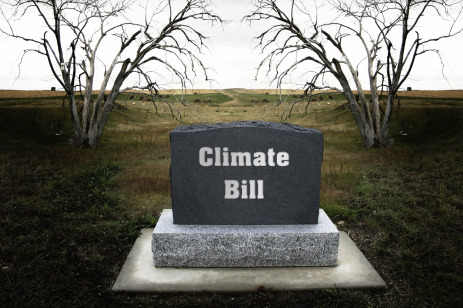 Climate and energy legislation could get buried even deeper if the GOP has a big election day.Climate and energy legislation is already dead, right? Well, yes. But after today it could be a lot deader.
Climate and energy legislation could get buried even deeper if the GOP has a big election day.Climate and energy legislation is already dead, right? Well, yes. But after today it could be a lot deader.
If the Republicans take over the House, it’s already pretty clear that you can forget about any real progress on climate change or clean energy for the next two years. But the impact of a big night for the GOP could ripple way beyond that.
Here’s a taste of how things could go from bad to worse:
- If House Democrats who have been getting hammered for voting for cap-and-trade legislation last year, such as Reps. Rick Boucher (Va.), Tom Perriello (Va.), and Harry Teague (N.M.), all lose, don’t expect moderates to go out on a limb on climate and energy legislation any time soon.
- It’s not a good sign when the lesser of two evils is to have Sen. Lisa Murkowski (R-Alaska) win her write-in campaign and become chair of the Senate’s Energy and Natural Resources Committee. Sure, she’s been trying to yank teeth out of the EPA all year, but she’s considered more reasonable on climate change and energy than the likely alternative, North Carolina’s Richard Burr, a playmate of Big Oil.
- If Sen. Barbara Boxer (D-Calif.) goes down, not only do enviros lose a long-time ally, but also her considerable influence as head of the Senate’s Environment and Public Works Committee.
- And in the gubernatorial races, a win by Republican Charlie Baker in Massachusetts could jeopardize the state’s participation in a regional climate initiative and also the nation’s first offshore wind farm. And even if Prop 23 loses in California, Meg Whitman, the Republican candidate for governor, has said she’ll suspend the state’s landmark greenhouse-gas law if she gets elected.
Politico’s Robin Bravender has more.
This land is their land: Another potential consequence of Republicans taking control of the House: Expect them to aggressively use the House’s Natural Resources Committee to open up federal lands to oil and gas drilling and slow efforts to expand the national parks. [Politico]
And in other green news:
Undergroundswell: Ten senators want a more extensive environmental review of the pipeline that would carry oil from the tar sands of Canada 1,661 miles through the U.S. to refineries in Texas. Last month, Secretary of State Hillary Clinton said the State Department would likely approve the project. [Mother Jones]
Artificial intelligence: The head of the House Science and Technology Committee says that while he isn’t endorsing geoengineering, he thinks a group such as the National Science Foundation should start researching the options for manipulating nature to slow climate change. [Washington Post]
Here’s a snippet from Rep. Bart Gordon’s (D-Tenn.) report:
Climate engineering carries with it a tremendous range of uncertainties and possibilities, ethical and political concerns, and the potential for catastrophic side effects. If we find ourselves passing an environmental tipping point, we will need to have done research to understand our options.
Crime marches on: Penn State environmental ethics professor Donald Brown asks the question that may have entered your mind a few times over the past year: Is climate science misinformation a crime against humanity? [Guardian]
Here’s a taste of what he had to say:
As long as there is any chance that climate change could create this type of destruction, even assuming, for the sake of argument, that these dangers are not yet fully proven, disinformation about the state of climate change science is extraordinarily morally reprehensible if it leads to non-action in reducing climate change’s threat. In fact, how to deal with uncertainty in climate change science is an ethical issue, not only a scientific matter, because the consequences of delay could be so severe and the poorest people in the world are some of the most vulnerable.
Airing it out: London, Toronto, and New York have become the first three cities to sign up for the Carbon Disclosure Project, which means they’ll regularly report their carbon footprints and greenhouse gas reduction strategies into a public database. [businessGreen.com]
Bad wrap: Nestle, Heinz, and General Mills are among the food companies with plans to remove Bisphenol A (BPA) from plastic packaging. [The Independent]
Leaf goes on: Nissan says it has already sold out the first shipment of its all-electric Leaf in the U.S. Most of the buyers are on the West Coast. [AFP]
Spin control: One way to keep wind turbines from killing bats and birds is to slow down the blades. [Discovery News]
The grass is greener: New research concludes that grass will eventually replace corn as the top biofuel in the U.S. [Bio Fuel Daily]
Pimpin’ for shrimp: BP has finally agreed to kick in money to test and market Gulf seafood. It’s creating a $48 million fund — $18 million to test Louisiana seafood and $30 million to market it. [The Hill]
Better straight than never: At a time when even Dems are running from cap-and-trade, it’s refreshing to see a candidate who talks straight on climate change. Meet Indiana’s Baron Hill. [GOOD]



